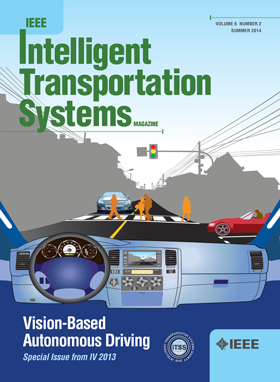Disturbance Compensation-Based Deep Reinforcement Learning Control Strategy for Underactuated Overhead Crane Systems: Design and Experiments
IF 7.9
1区 工程技术
Q1 ENGINEERING, CIVIL
IEEE Transactions on Intelligent Transportation Systems
Pub Date : 2025-03-11
DOI:10.1109/TITS.2025.3547322
引用次数: 0
Abstract
Transportation systems often exhibit uncertainty, dynamics, and nonlinearity, making them highly susceptible to perturbations. Overhead crane systems, being a crucial mode of transportation, find wide application in engineering practice. This paper proposes a compound control strategy for underactuated overhead crane systems, combining a deep reinforcement learning controller with a novel observer-based disturbance compensation algorithm. The aim is to suppress model uncertainties and external disturbances. Initially, an equivalent state variable is constructed to stabilize the overhead crane system, simplifying controller design. Subsequently, the model uncertainties and external disturbances are treated as generalized disturbances and incorporated as a new state. This state is estimated and compensated through a super-twisting extended state observer (STESO) with finite-time convergence. Lyapunov-based analysis demonstrates that the established state observer can reduce the residual estimate error to zero. Moreover, the Deep Deterministic Policy Gradient (DDPG) algorithm, a form of deep reinforcement learning, is employed to effectively eliminate tracking errors. The proposed scheme enables the underactuated system to achieve satisfactory performance, with adaptive control effort suited to different control states and disturbances. Simulation and hardware experiments are conducted, comparing the proposed control strategy with traditional methods, to illustrate its effectiveness and robustness.求助全文
约1分钟内获得全文
求助全文
来源期刊

IEEE Transactions on Intelligent Transportation Systems
工程技术-工程:电子与电气
CiteScore
14.80
自引率
12.90%
发文量
1872
审稿时长
7.5 months
期刊介绍:
The theoretical, experimental and operational aspects of electrical and electronics engineering and information technologies as applied to Intelligent Transportation Systems (ITS). Intelligent Transportation Systems are defined as those systems utilizing synergistic technologies and systems engineering concepts to develop and improve transportation systems of all kinds. The scope of this interdisciplinary activity includes the promotion, consolidation and coordination of ITS technical activities among IEEE entities, and providing a focus for cooperative activities, both internally and externally.
 求助内容:
求助内容: 应助结果提醒方式:
应助结果提醒方式:


